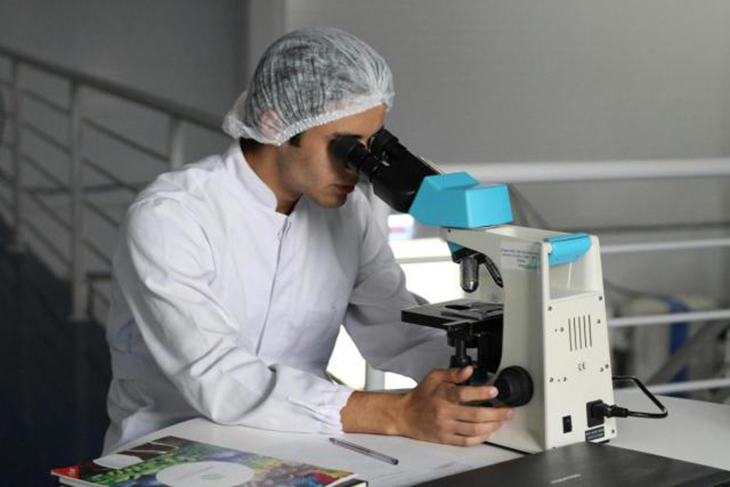
Oxford University scientists have made a groundbreaking discovery that could revolutionize cancer diagnosis and prevention. Their research has identified specific proteins in the blood that can signal the presence of cancer up to seven years earlier than current methods allow.
In two comprehensive studies, the researchers pinpointed 618 proteins associated with 19 different types of cancer. Notably, they found 107 proteins in individuals whose blood samples were taken at least seven years before their cancer diagnosis. This suggests that these proteins could be indicators of the very early stages of cancer, presenting an opportunity for intervention long before symptoms arise.
The significance of this discovery lies in its potential to transform cancer treatment and prevention. By detecting these proteins early, it may be possible to treat cancer at a stage where it is more manageable or even prevent it from developing altogether.
The team employed a sophisticated technique known as proteomics, which enables the large-scale analysis of proteins within tissue samples. This method allows scientists to observe interactions between proteins and identify significant differences between samples from healthy individuals and those who later developed cancer.
In the first study, blood samples from over 44,000 British participants, including more than 4,900 who were subsequently diagnosed with cancer, were analyzed. The researchers scrutinized a set of 1,463 proteins in each blood sample, comparing those who developed cancer with those who did not. This comparison revealed crucial differences that pointed to specific proteins linked to cancer risk. Additionally, they identified 182 proteins that showed variations in the blood up to three years before a cancer diagnosis.
The second study involved an in-depth examination of genetic data from over 300,000 cancer cases to further explore which blood proteins are involved in cancer development. This investigation uncovered 40 proteins that affect the risk of nine different cancer types. While modifying these proteins might alter cancer risk, the researchers also identified potential side effects that could arise from such alterations.
Despite the promising findings published in Nature Communications, the scientists emphasized the need for further research to fully understand the role these proteins play in cancer development. They aim to determine which proteins are the most reliable for testing, develop tests to detect these proteins, and identify drugs that could target them effectively.
This pioneering research marks a significant step forward in the fight against cancer, offering hope for earlier detection and more effective prevention strategies. As the research progresses, it holds the promise of fundamentally changing how cancer is diagnosed and treated, potentially saving countless lives in the future.
“To save more lives from cancer, we need to better understand what happens at the earliest stages of the disease,” Dr. Keren Papier, co-author of the first study, said.
“We need to study these proteins in depth to see which ones could be reliably used for prevention,” Dr. Papier, a Senior Nutritional Epidemiologist at Oxford Population Health as well, also added.
“Data from thousands of people with cancer has revealed really exciting insights into how the proteins in our blood can affect our risk of cancer,” Dr. Papier said.
“The genes we are born with, and the proteins made from them, are hugely influential in how cancer starts and grows,” co-author Dr Joshua Atkins, a Senior Genomic Epidemiologist, explained.
Thanks to the contributions of thousands of individuals who donated blood samples to the UK BioBank, researchers are now able to construct a far more detailed understanding of how genes influence cancer development over extended periods.
“We’ve predicted how the body might respond to drugs that target specific proteins, including potential side-effects. Before clinical trials, we have some early indications of which proteins we might avoid targeting because of unintended side-effects,” co-author Dr. Karl Smith-Byrne said.
“This research brings us closer to being able to prevent cancer with targeted drugs – once thought impossible but now much more attainable,” the Senior Molecular Epidemiologist at Oxford said.
“To be able to prevent cancer, we need to understand the factors driving the earliest stages of its development,” added another team member, Professor Ruth Travis.
“These studies are important because they provide many new clues about the causes and biology of multiple cancers, including insights into what’s happening years before a cancer is diagnosed.”
“We now have technology that can look at thousands of proteins across thousands of cancer cases, identifying which proteins have a role in the development of specific cancers, and which might have effects that are common to multiple cancer types,” Prof. Travis stated.
Dr. Iain Foulkes, an executive director at Cancer Research UK, the organization that provided the funds for the work said, “Preventing cancer means looking out for the earliest warning signs of the disease.
“That means intensive, painstaking research to find the molecular signals we should pay closest attention to.”
“Discoveries from this research are the crucial first step towards offering preventative therapies which is the ultimate route for giving people longer, better lives, free from the fear of cancer.”



